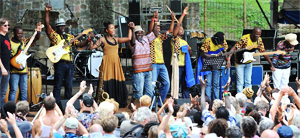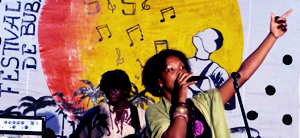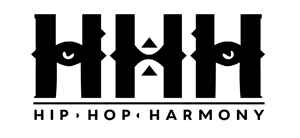Super Mama Djombo

Super Mama Djombo
Before a nation can become real, it must first be imagined. It is fitting that Super Mama Djombo, the orchestra that has been the cultural stamp of Guinea-Bissau’s national identity since independence, was born in the fertile imagination of children. Four young friends started the band at a boy scout camp in the mid-60s. Searching for a home-grown name, they chose Mamadjombo, a sovereign and revered female spirit that revolutionaries appealed to for protection.
Orchestra Super Mama Djombo led an effervescent period of cultural revolution in the independence era. The band sang a new national identity: neither Portuguese nor divided by indigenous roots. They reinvented Kriol (the synthesis of Portuguese and African languages spoken in the cities) into the language of national unity. Their success was almost immediate. They toured Lusophone Africa, Cuba, and Portugal and traveled regularly with first President Luís Cabral, representing the new nation to ecstatic crowds.
In 1980 the band went for its first recording sessions in Lisbon and blazed through 6 hours of tape. Their releases on LP extended the band‘s reach and opened new opportunities—particularly the track “Pamparida.” Adapted from a children’s play song, this infectious track made the band a West African sensation. It was probably “Pamparida” that filled a stadium in Senegal to capacity, where a then-unknown Youssou N’Dour opened for the Orchestra. When the music started, the crowds outside literally broke down the doors to hear Mama Djombo play. Later that year Luís Cabral was deposed, and opportunities at home began to dry up.
The founding members of the band spread to the corners of the world—building new lives, developing solo careers—but the band continued to resurge and reflect the people back to themselves: the soundtrack of the Bissau-Guinean film “Blue Eyes of Yonta” (awarded “Un Certain Regard“ at Cannes Film Festival), some limited releases in Portugal, and the album “Ar Puro,” produced and released in Iceland in 2008. Bissau-Guineans of all generations know these songs by heart.
“Guinea-Bissau is the source,“ says lead composer Atchutchi, “no matter where you go.”
Super Mama Djombo on T. P. Africa
Super Mama Djombo on Radio Cobiana
Festival de Bubaque

Festival de Bubaque
Cobiana Communications co-produces and implements the Festival de Bubaque, a three-day music festival in the Bijagos Archipelago that takes place every year on Easter weekend. The Festival is a platform for promoting the Bijagos Archipelago and of Guinea-Bissau in general. It is a meeting place for national artists of reference, renowned international artists, and the music and folklore of the Bijagos. The Festival was created to recognize, respect and highlight the Bijagos Archipelago as a globally important preserve of biodiversity and human culture and is a vehicle for producers, visitors, and Bijago people to preserve and promote these unique and precious aspects of the Archipelago. All visitors are considered guests of the Archipelago, of the Bijogo people, and of the land itself.
Hip Hop Harmony

Hip Hop Harmony
Hip Hop Harmony “HHH” combines an artist residency including workshops and mutual industry development with a regional tour to showcase the power of collaboration on a regional scale. HHH was incepted October 2009, under the auspices of the Waga Hip Hop Festival in Burkina Faso where music industry professionals from Mali, Senegal, Morocco, Guinea-Bissau and Mauritania converged with the common mission to bridge divides in Africa created by history, politics, and languages while growing real, impactful hip hop in the Region. Cobiana was appointed by the partners of HHH to be the principal coordinator of the project. HHH is an initiative of Cobiana Communications, Festival L’Boulevard, Zaza Productions/ Assalamalekoum Hip Hop festival, AHM: Mali Hip Hop Association, Africulturban, Festa2H, STAYCALM! Productions, Nomadic Wax, and the Pan African Urban Culture festival Network: UMOJA.
Big UP GB Movimento Hip Hop

Big Up GB
Cobiana provides meeting and rehearsal space to Big Up GB, Guinea-Bissau’s nascent hip hop cooperative, and often enjoys a rich collaboration with the new generation of Bissau-Guinean artists. In May 2009, in the wake of political assassinations destabilizing the country, Cobiana and Big Up GB produced the first national Hip Hop festival, using the language of Hip Hop to engage youth in the call for peace and stability. The Festival filled to the walls of the capital’s Lino Correia Stadium where 16 groups were staged with a live backing band. For the first time Hip Hop in Bissau was not only “live and direct” but coming together to form one, powerful voice of national solidarity. When two more political assassinations shook the capital, the next day Cobiana and Big Up had 6 MCs in the studio rapping their reactions. The resulting mix tape was out within two weeks.
In August 2009 two Big Up GB artists were abducted by the military and interrogated for two days as a result of a particular song calling for transparency and accountability. In response to the incident, Cobiana teamed up with Impossible Music Sessions to build international alliances supporting artistic expression in Bissau. U.S. rapper Hasan Salaam interpreted the offending song before a live audience in Brooklyn, with Bissau rappers participating via videoconference. This cross-Atlantic collaboration unlocked funding for Cobiana to bring Hasan Salaam to Bissau in November 2010. Hasan facilitated workshops on writing and the history of African American music as social intervention, and staged a collaborative, solidary concert with the artists of Big Up GB.
Guinea-Bissau Music Production at a Global Standard

Servers & Studios
Cobiana Communications & Culture secured donations of over $10,000 in freight and services to move the Cobiana Records recording studio from Oakland, California to Bissau, Guinea-Bissau. The studio is now operational and is particularly well-suited for acoustic recordings. We price recording services at least 50% lower than other studios in the sub-region, and reinvest proceeds into building the studio. Our goal is to cut our rate in half again for Bissau-Guinean musicians—part of our strategy for getting prolific.
Cobiana was recently awarded a grant from the European Development Fund to expand the studio and develop digital promotion and dissemination.









